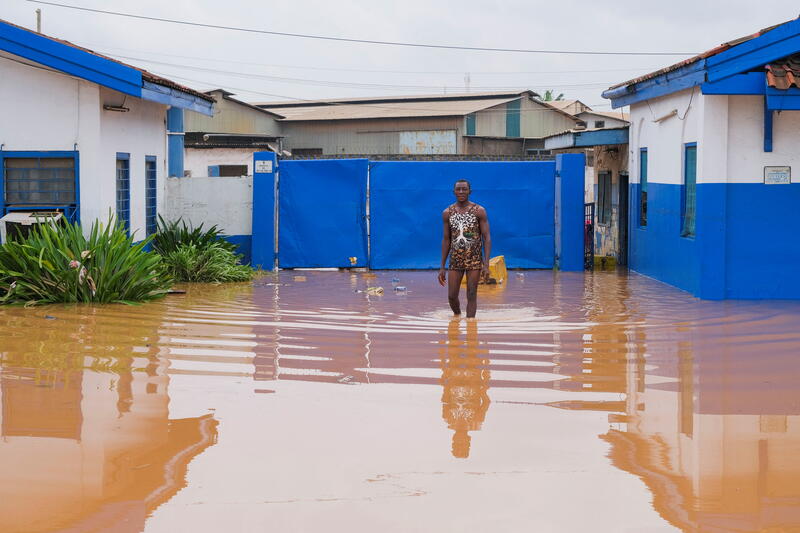To cover climate change in resource-strapped newsrooms, journalists need to embrace collaboration

Boateng, a security guard, wades through flood waters after heavy rains in Accra, in May 2022. Credit: Francis Kokoroko/Reuters
In February 2023, two Ghanaian climate journalists launched the first collaborative climate journalism project in our country.
The Climate Journalism Network Ghana was launched by Abdullah Afedzi, a freelance climate journalist and myself. It represents an attempt at unifying climate journalists, offering free tools and resources to enhance their climate storytelling. In a country where politics dominate the headlines, effective climate journalism collaboration is key to breaking the status quo.
Climate change remains one of the greatest threats to human existence, and in Ghana, it manifests in extreme weather conditions, drought, flooding and coastal erosion—the country lost about 37% of its coastal land to erosion and flooding between 2005 and 2017. In April 2022, over 80 houses and dozens of farms were destroyed by tidal waves, displacing over a thousand residents in the Keta and Agavedzi communities.
And yet, about 53% of Ghanaians are not even aware of climate change, according to a 2022 study conducted by Afrobarometer, underpinning the need to address ‘climate illiteracy’. The media plays a significant role in enhancing climate awareness through insightful and accurate reportage.
Ideally, great climate coverage means that Ghanaians will understand the impact of climate change, snap out of climate oblivion and be inspired to take action. Policymakers will be forced to act and formulate climate-focused policies.
But in reality, resource constraints hinder journalists’ ability to produce the kinds of in-depth climate stories that can really connect with audiences. The decline in the fortunes of media organisations and corresponding lean newsroom budgets makes it almost impossible for an individual journalist to travel miles across the country to produce a climate story.
To cover climate effectively, journalists like myself have to rely on collaboration. My personal story of covering climate began with a defining moment in 2018. That year, I was selected to join the second cohort of journalists undergoing a one-week training program organised by the Environmental Protection Agency of Ghana. This workshop enhanced my basic understanding of key climate concepts, and also helped me develop human-centred climate stories.
The training started my transition from being a political reporter to a climate journalist. Through this training, I realised that collaboration is key to navigating the setbacks that exist in climate journalism. The global reach and impact of the 2016 Panama Papers investigation, which involved over 500 reporters across 80 countries, inspired us to think about the importance of collaboration, whether it’s based around one story or project or is a permanent relationship.
That goes for collaboration with academia, too. An estimated 40 journalists were trained at the first climate journalism workshop by lecturers and researchers at the Center for Climate Change and Sustainability Studies, and the School of Communication—both at the University of Ghana.
Similarly, in newsrooms in Ghana and elsewhere in the Global South, these projects offer a chance to pool resources and produce more ambitious climate stories.
Journalism networks also relieve the burden for climate journalists: sharing resources and providing a support system in terms of story ideas, interview sources and climate data. They promote peer-to-peer learning where experienced climate journalists can mentor and train young colleagues who are passionate about climate journalism.
The growth of the Oxford Climate Journalism Network offers a potent blueprint for individuals and organisations that intend to establish a local network of climate journalists. The International Journalists Network, Hostwriter and the Global Investigative Journalism Network are equally robust success stories that hinge on collaboration.
Creating a local and country-specific Climate Journalism Network provides Ghanaians with relatable and contextualised reporting. This helps citizens to understand the direct impacts of climate change on their lives. It also enhances community engagement which is crucial to driving local climate action and solutions.
Collaborative climate journalism projects must take into consideration the different newsroom cultures, varying levels of expertise, resource gaps and audience reach. Partnerships between journalists, media organisations and stakeholders in the climate sector must be anchored on transparency, trust, mutual respect, strict journalism standards and ethics.
I’m optimistic that collaborative climate journalism will open the floodgates for quality climate storytelling. It will establish a paradigm shift for a media industry that is deep-rooted in exclusives and competition, towards healthy partnerships serving a greater good.
The survival and sustainability of climate journalism is anchored on collaboration.






